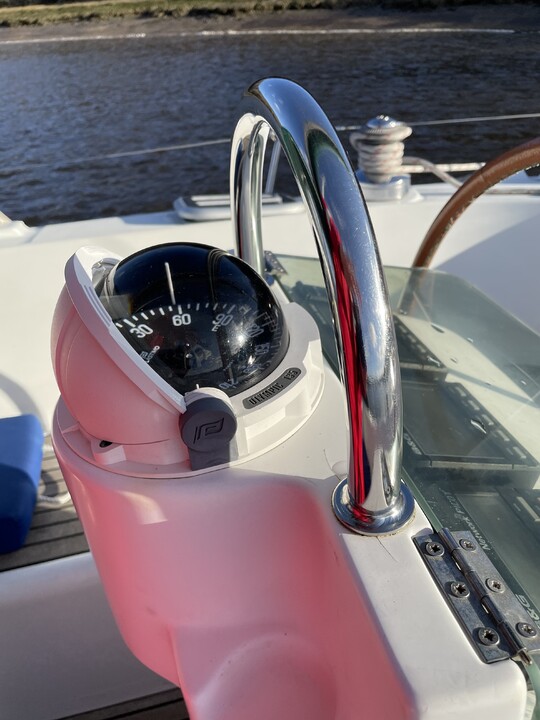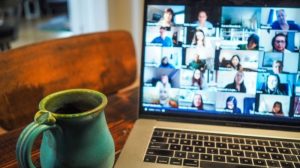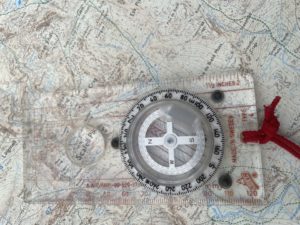In the previous posts I have introduced why using a compass in the field and in our personal and business lives is both critical and full of hidden traps for the unwary. There are 3 main sources of error. Variation occurs when translating magnetic data onto a chart and vice versa and Deviation which occurs when the compass is adversely affected by strong magnetic sources around it. This causes an inaccurate reading. Both the effects of Variation and Deviation can then be Amplified through unskilled use. Small errors as has already been said, cause significant error, over time and distance.
This last article will try and highlight practical ways we as navigators take Deviation into account in the way we steer our vessels, businesses and lives.
In terms of Deviation the translation from pure navigational principles to organisational life, are relatively simple to explain and, in some cases, a real challenge to do.
As a reminder… a compass is affected by all the electromagnetic sources around it so that the reading of Magnetic North is compromised just a little. Over time and distance this error is amplified having the potential for major issues. The extent of this inevitable contamination is calculated by a yearly examination. Each compass is scrutinised and measured against known and agreed bearings. This gives the degree of error which can then be added or subtracted in all subsequent navigational calculations. This is called swinging the compass.
So, in the organisational setting this means that each ‘compass’ (Individual and corporate) needs scrutiny on a regular basis as contamination can come from many sources including…
- A belief we are right, and others are wrong… of course this will never be expressed like this!
- Or living in a bubble where challenge and different views, are discouraged… or more worryingly are cancelled out… or made illegal. Places of learning please take note!
- Inaccurate assumptions…. Again, the Kay and King exploration of risk models and probability, is a sobering read and potentially life changing. (Radical Uncertainty by John Kay and Mervyn King)
- Outdated ‘facts’
- Belief systems that are fixed
- Becoming ‘encultured’ so that thinking, and behaviour simply adopts ‘the way we do things around here’ without critical scrutiny. Becoming uncultured happens very fast
- The compass is ‘positioned’ next to people who are dominant and have strong views and are not prepared to engage in real exploration
- A singularity of vision that simply follows one model, one guru or one explanation of how things work
- A fixation of trying to understand the meta narrative, whilst ignoring the more important ‘little stories’
- Social media
- A press that is agenda driven
- Sophisticated Campaigns from hostile and foreign players who try and influence what we think and feel
- An inability to differentiate between models / algorithms and real life.
… and I am sure you could continue this list! The point being that there are many sources that will influence our compass… it is inevitable, it is not something to be alarmed about, but it does require practical actions to reduce the impact.
There are many obvious ways of ‘swinging the compass’ and here are just a few examples of how we might calibrate and accommodate such error.
- Reading books, articles and papers from other disciplines and perspectives
- Listen and spend time with others who hold a different view. I was asked to attend a ‘Conference of Bishops’ from the Anglican Church at Durham University to consider the moral questions arising from Artificial Intelligence. My invitation was based on my work and writing around Leadership, Change, Transformation and Navigation. I felt like a fish out of water which was amplified when many of those attending seemingly reverted back to their master’s and doctorate programmes having studied ‘Philosophy and Politics’. But my valuable and useful discomfort, was as nothing compared to what this group went through after inviting a particular keynote speaker for the 3 days. She was a vociferous atheist, one of the worlds leading academics in things Digital and Medical and she operated from a Theoretical Physics discipline. She didn’t hold back in her opinion of things of faith. It was awkward, challenging, informative and utterly inspired. The bishops could have played safe, but they were courageous (or mad enough), to let their own compasses come under scrutiny. It was an uncomfortable and yet valuable time!
- Spend time in a different culture that sees the world from an alternative perspective.
- Seek out and play with the challenging questions remembering that not all questions have answers… currently
- Have great critical friends around you including coaches and mentors. Listen to them…!
- Take time to listen to other’s stories and narratives that try and explain what is going on in different worlds. Stories become even more relevant when the known facts run out
- Spend time with the sceptics whilst avoiding the cynics
And again, I am sure you could continue the list! The point is to allow scrutiny and become aware of where your compass and mine, might have picked up stuff from life which is not accurate or just out of time. This then can be adjusted and outworked in the way we make those continual choices in this ever-changing world.
Two Questions.
- In what ways do you allow your compass(es) to be scrutinised for the inevitable bias which we all have?
- How do you practically adjust your internal compass to take account of such bias?
Thank you for taking time to read this article and perhaps others in the series. I hope you found some value. I hope too they sparked your curiosity. What I have written, is only a tiny glimpse of a much bigger subject and my navigator friends will ask ‘why I didn’t say this or that?!’ And that is for them to write about. Perhaps you will discover a new insight which you could feed into the warehouse of organisational learning.
One question that has already cropped up though is ‘what do you do if you don’t have a compass?’ Well, the story of the ancients gives us a clue. There were two options. Stay in sight of land and pilot your vessel repeating the same journey over and over. You discover little new about your world and indeed yourself. If you are blown out to sea, you can panic and pray! (but perhaps find new places and peoples)
Or you follow a sense of adventure and set off with just the Northern Star or the Southern Star, to guide you. And adventures you will have, discovering all sorts of things… as Lief Erikson (Lief the Lucky) did over 1000 years ago setting foot in America 500 years before Christopher Columbus… but that is a story for another time.
Links to the series of articles:



